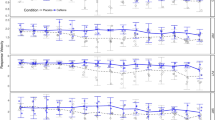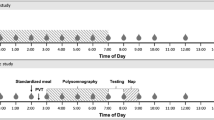Abstract
This study assessed the ability of high doses of caffeine to reverse changes in alertness and mood produced by prolonged sleep deprivation. Fifty healthy, nonsmoking males between the ages of 18 and 32 served as volunteers. Following 49 h without sleep, caffeine (0, 150, 300, or 600 mg/70 kg, PO) was administered in a double-blind fashion. Measures of alertness were obtained with sleep onset tests, the Stanford Sleepiness Scale (SSS), and Visual Analog Scales (VAS). Sleep deprivation decreased onset to sleep from a rested average of 19.9 min to 7 min. Following the highest dose of caffeine tested, sleep onset averaged just over 10 min; sleep onset for the placebo group averaged 5 min. Scores on the SSS increased from a rested mean of 1.6–4.8 after sleep deprivation. Caffeine reduced this score to near rested values. Caffeine reversed sleep deprivation-induced changes in three subscales of the POMS (vigor, fatigue, and confusion) and produced values close to fully rested conditions on several VAS. Serum caffeine concentrations peaked 90 min after ingestion and remained elevated for 12 h. This study showed that caffeine was able to produce significant alerting and long-lasting beneficial mood effects in individuals deprived of sleep for 48 h.
Similar content being viewed by others
References
Bonati M, Latini R, Galletti F, Young JF, Tognoni G, Garattini S (1982) Caffeine disposition after oral doses. Clin Pharmacol Ther 32:98–106
Chait LD, Griffiths RR (1983) Effects of caffeine on cigarette smoking and subjective response. Clin Pharmacol Ther 34:612–622
Chait LD, Johanson CE (1988) Discriminative stimulus effects of caffeine and benzphetamine in amphetamine-trained volunteers. Psychopharmacology 96:302–308
Choi OH, Shamin MT, Padgett WL, Daly JW (1988) Caffeine and theophylline analogues: correlation of behavioral effects with activity as adenosine receptor antagonists and as phosphodiesterase inhibitors. Life Sci 43:387–398
Dews PB (1984) Behavioral effects of caffeine. In: Dews PB (ed) Caffeine. Springer, New York, pp 86–103
Finn IB, Iuvone PM, Holtzman SG (1990) Depletion of catecholamines in the brain of rats differentially affects stimulation of locomotor activity by caffeine,d-amphetamine, and methylphenidate. Neuropharmacology 29:625–631
Fredholm BB (1985) On the mechanism of action of theophylline and caffeine. Acta Med Scand 217:149–153
Gaillard JM (1985) Neurochemical regulation of the states of alertness. Ann Clin Rese 1:121–134
Goldstein A, Warren R, Kaizer S (1965) Psychotropic effects of caffeine in man. I. Individual differences in sensitivity to caffeine-induced wakefulness. J Pharmacol Exp Ther 149:156–159
Griffiths RR, Woodson PP (1988) Reinforcing properties of caffeine: studies in humans and laboratory animals. Pharmacol Biochem Behav 29:419–427
Griffiths RR, Bigelow GE, Liebson IA (1986) Human coffee drinking: reinforcing and physical dependence producing effects of caffeine. J Pharmacol Exp Ther 239:416–425
Griffiths RR, Bigelow GE, Liebson IA (1989) Reinforcing effects of caffeine in coffee and capsules. J Exp Anal Behav 52:127–140
Griffiths RR, Evans SM, Heishman SJ, Preston KL, Sannerud CA, Wolf B, Woodson PP (1990) Low-dose caffeine discrimination in humans. J Pharmacol Exp Ther 252:970–978
Hoddes E, Zarcone V, Smythe H, Phillips R, Dement W (1973) Quantification of sleepiness: a new approach. Psychophysiology 10:431–436
Johnson LC, Spinweber CL, Gomez SA (1990) Benzodiazepines and caffeine: effect on daytime sleepiness, performance, and mood. Psychopharmacology 101:160–167
Kamimori GH, Penetar DM, Chamberlain AC, Brunhart GE, Brunhart AE (1991) The effects of 48 h of sleep deprivation on caffeine pharmacokinetics in man. FASEB (Abstract 6945)
Karacan I, Thronby JI, Anch AM, Booth GH, Williams RL, Salis PJ (1976) Doserelated disturbances induced by coffee and caffeine. Clin Pharmacol Ther 20:682–689
Kennedy JS, LeDuc BW, Scavone JM, Harmatz JS, Shader RI, Greenblatt DJ (1987) The pharmacokinetics of intravenous caffeine: comparison of HPLC and DB methods. J Chromatogr Biomed Appl 422:274–280
Lieberman HR, Wurtman RJ, Emde GC, Coviella ILG (1987) The effects of caffeine and aspirin on mood and performance. J Clin Psychopharmacol 7:315–320
Loke WH (1988) Effects of caffeine on mood and memory. Physiol Behav 44:367–372
Loke WH, Hinrichs JV, Ghonheim MM (1985) Caffeine and diazepam: separate and combined effects on mood, memory, psychomotor performance. Psychopharmacology 87:344–350
Lumley M, Roehrs T, Asker D, Zorick F, Roth T (1987) Ethanol and caffeine effects on daytime sleepiness/alertness. Sleep 10:306–312
McNair DM, Lorr M, Droppleman LF (1981) Profile of Mood States (manual). Educational and Industrial Testing Service, San Diego, California
Mikulincer M, Babkoff H, Caspy T, Sing H (1989) The effects of 72 hours of sleep loss on psychological variables. Br J Psychol 80:145–162
Newhouse PA, Belenky G, Thomas M, Thorne D, Sing HC, Fertig J (1989) The effects ond-amphetamine on arousal, cognition, and mood after prolonged total sleep deprivation. Neuropsychopharmacology 2:153–164
Nicholson AN, Pascoe PA (1990) Dopaminergic transmission and the sleep-wakefulness continuum in man. Neuropharmacology 29:411–417
Roache JD, Griffiths RR (1987) Interactions of diazepam and caffeine: behavioral and subjective dose effects in humans. Pharmacol Biochem Behav 26:801–812
Snaith RP, Bridge GWK, Hamilton M (1976) The Leeds scales for the self-assessment of anxiety and depression. Br J Psychiatry 128:156–165
Somani SM, Gupta P (1988) Caffeine: a new look at an age-old drug. Int J Clin Pharmacol Ther Toxicol 26:521–533
Stern KN, Chait LD, Johanson CE (1989) Reinforcing and subjective effects of caffeine in normal volunteers. Psychopharmacology 98:81–88
Stoner GR, Skirboll LR, Werkman S, Hommer DW (1988) Preferential effects of caffeine on limbic and cortical dopamine systems. Biol Psychiatry 23:761–768
Thorne DR, Genser SG, Sing HC, Hegge FW (1985) The Walter Reed Performance Battery. Neurobehav Toxicol Teratol 7:415–418
Walsh JK, Muehlbach MJ, Humm TM, Dickins QS, Sugerman JL, Schweitzer PK (1990) Effect of caffeine on physiological sleep tendency and ability to sustain wakefulness at night. Psychopharmacology 101:271–273
Weiner N (1980) Norepinephrine, epinephrine, and the sympathomimetic amines. In: Gilman AG, Goodman LS, Gilman A (eds) The pharmacological basis of therapeutics, 6th edn. Macmillan, New York, pp 138–175
Weiss B, Laties VG (1962) Enhancement of human performance by caffeine and the amphetamines. Pharmacol Rev 14:1–36
Zwyghuizen-Doorenbos A, Roehrs TA, Lipschutz L, Timms V, Roth T (1990) Effects of caffeine on alertness. Psychopharmacology 100:36–39
Author information
Authors and Affiliations
Rights and permissions
About this article
Cite this article
Penetar, D., McCann, U., Thorne, D. et al. Caffeine reversal of sleep deprivation effects on alertness and mood. Psychopharmacology 112, 359–365 (1993). https://doi.org/10.1007/BF02244933
Received:
Revised:
Issue Date:
DOI: https://doi.org/10.1007/BF02244933




